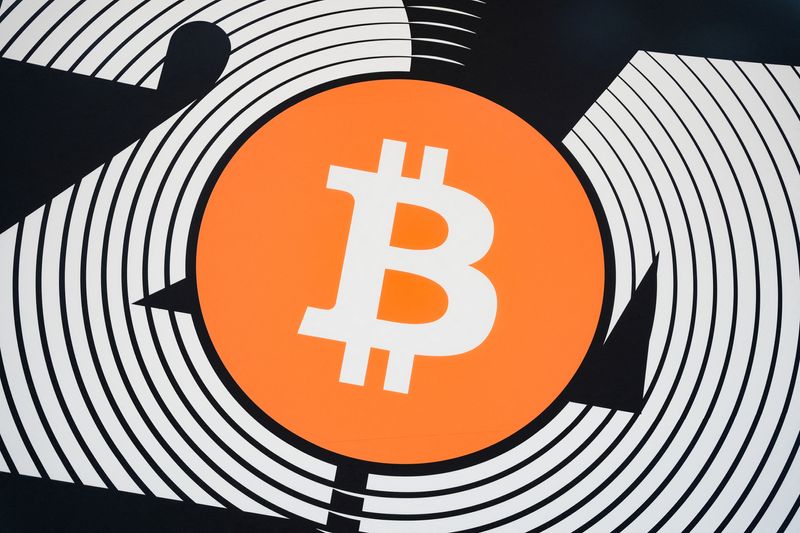(Reuters) – Bitcoin smashing the $100,000 barrier raises the prospect of the cryptocurrency going mainstream, U.S. inflation data will show how much pressure there is on the Fed to adjust rates and central banks in Europe, Australia and Brazil meet.
Here’s what to look out for in the week ahead from Marcela Ayres in Brasilia, Kevin Buckland in Tokyo, Ira Iosebashvili in New York, and Dhara Ranasinghe and Amanda Cooper in London.
1/ FOUR, AND COUNTING
For ECB policymakers, their last meeting in October must seem a lifetime ago.
Since then, Donald Trump’s U.S. election win means the euro area faces renewed economic pain with likely tariffs, and governments in heavyweight Germany and France have collapsed, with the latter engulfed in its second political crisis in six months. All that has dealt a blow to sentiment in a bloc where business activity is deteriorating – and the euro has slid.
The ECB, also no stranger to hard times, is expected to deliver its fourth quarter-point rate cut on Thursday, with more cuts anticipated.
A pick-up in inflation means a bigger rate cut is unlikely. And yes, you guessed it, ECB chief Christine Lagarde will likely stress caution and data-dependency.
2/ A CUT AND A HARD PLACE
Australia’s central bank, which meets on Tuesday, is in a tight spot. The economy is sputtering, the currency is at four-month lows and yet inflation is sufficiently persistent to make repeated rate cuts unlikely.
The chances of a quarter-point reduction are below 15% and rates are expected to take until July to fall even 50 bps.
The Bank of Canada, by contrast, looks set to answer investors’ wishes for more cuts. It has said inflation is a thing of the past and more cuts could be in the offing, leaving the market split on whether its Dec. 11 meeting will yield a 25- or even a 50-bps cut.
Enter the most dovish of the G10 central banks – the Swiss National Bank. With inflation at 0.7%, it is expected to cut rates by 50 bps on Dec. 12.
3/ NO HURRY
Markets gaming out the trajectory for Federal Reserve policy in the months ahead get a U.S. inflation reading on Wednesday. The Fed has shaved 75 basis points (bps) off interest rates since September, following months of cooling inflation – expectations are towards another 25 bps cut later in December.
But the path ahead is less clear. The economy has proved stronger than expected, and Fed Chair Jerome Powell has said there is little reason to hurry the pace of cuts.
A strong number could bolster that view, potentially reigniting a bond selloff and strengthening the dollar if investors decide to further unwind bets on how much the Fed will cut next year. Economists polled by Reuters expect consumer prices to have risen 0.2% in November – matching the October rise.
4/ BITCOIN BREAKOUT
There was something inevitable in Bitcoin’s record surge past $100,000 after Trump’s election promises to make America “the crypto capital of the planet”.
But it did so in resounding fashion, vaulting from below $99,000 to as high as $103,619 in the space of two hours before catching its breath. The catalyst may have been confirmation of Trump’s choice of crypto veteran Paul Atkins to run the SEC. Of course, $100,000 is just a number – but one the faithful and the sceptical regard as a major milestone in Bitcoin’s 16-year journey towards legitimacy.
Recall though that its history is written in breathless rallies and white-knuckle reversals. While numbers like $150,000 are already being mentioned for 2025, the token is flashing overbought on daily, weekly, monthly and quarterly charts.
5/ FINAL ACT
Brazil’s central bank holds its final meeting under Governor Roberto Campos Neto on Wednesday, with bets on a sharper 75 bps hike after two raises that brought rates to 11.25%.
Campos Neto, set to hold a news conference on Dec. 19, said a positive fiscal shock could relieve pressure on the exchange rate and long-term yields in Latin America’s largest economy. But the government’s widely anticipated fiscal package disappointed markets, driving up risk premiums on major assets.
Brazil’s real has weakened some 20% against the dollar year-to-date, and strong economic resilience – on display in the third quarter – is fuelling inflation worries. As policymakers grapple with mounting challenges, Congress debates measures to curb spending and contain debt growth.
(Graphics by Sumanta Sen, Kripa Jayaram and Prinz Magtulis, Compiled by Karin Strohecker, Editing by Barbara Lewis (JO:LEWJ))

